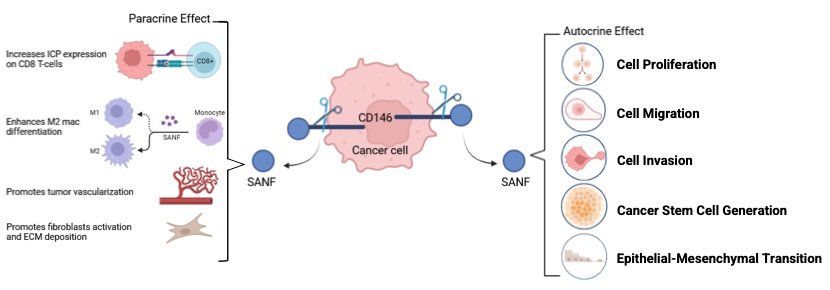Our Science & Pipeline
CD146 and SANF have been identified as major players in fibrosis and in mechanisms leading to tumor development and resistance to treatment

CD146, also known as MCAM (Melanoma Cell Adhesion Molecule), was identified over 30 years ago as a key protein involved in tumor progression. The team led by Dr. Marcel Blot Chabaud and Prof. Nathalie Bardin (C2VN, INSERM1263, INRAE1260, AMU) has been a pioneer in understanding its role, highlighting its presence in all vascular cells and characterizing its impact on endothelial permeability and leukocyte migration.
The team discovered the existence of membrane-bound isoforms as well as a soluble form of CD146, which they named SANF (Soluble Angiogenic Neoplastic and Fibrotic factor). This discovery led to around fifteen years of extensive, exclusive, and pioneering research into the pathobiological characterization of this factor. Their work demonstrated that SANF, secreted by approximately 35 to 40% of cancer cells, stimulates three major processes that promote tumor aggressiveness:
-
Angiogenesis, enhancing tumor vascularization
-
Epithelial-to-mesenchymal transition, leading to metastasis
-
Increase in immune checkpoint expression, contributing to immune evasion
-
Fibroblast-to-myofibroblast transition, promoting tumor fibrosis
Translational research, based on the analysis of clinical samples from patients, confirms the key role of SANF in tumor defense and resistance to sunitinib (in clear cell renal carcinoma) and bevacizumab (in glioblastoma), further supporting its potential as a therapeutic target. Building on this evidence, the team has initiated the development of a selective monoclonal antibody against SANF, named mucizumab, designed to specifically block SANF without affecting its membrane-bound “sister” form, which is essential for normal vascular functions.
Our Pipeline
Development of first-in-class antibodies targeting SANF and other components associated with fibrotic cancers and diseases